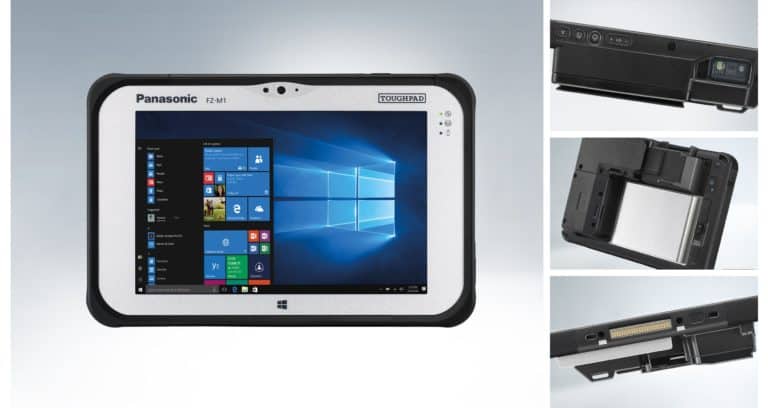Panasonic’s Toughpad FZ-M1 Passport is a new rugged tablet made for identification and access control. Panasonic developed the device with security services in mind, but also with the entertainment and hospitality sector in mind.
Rugged specialist Panasonic introduces the Toughpad FZ-M1 Passport, a robust tablet for the control and identification of people. For this purpose, the tablet can be configured with a variety of reading and scanning technologies, such as a 2D barcode reader, RFD or MRZ for passports. Panasonic sees the tablet being used, for example, at customs posts or for the access control of concerts.
To cope with these often challenging conditions, the device can withstand a fall from a maximum height of 1.5 metres and survives the rain thanks to its IP65 rating. The tablet works both in the freezing cold at -29 degrees and in extreme heat, with a maximum operating temperature of 60 degrees. The screen brightness of 700cd/m² and the anti-reflective protective layer must ensure that the tablet is easy to operate even in direct sunlight.
Further development of the tablet
The FZ-M1 Passport is a spinoff of the existing FZ-M1 mk3: a standard tablet with similar specifications. Under the hood, you’ll find a seventh-generation Intel Core i5 CPU. Panasonic is not yet communicating on further internal specifications. Panasonic claims that the device’s battery life is up to 18 hours.
Those who want to use the tablet to capture documents, or occasionally need to make video calls, have an 8 MP main camera with flash and a 2 MP self-camera.
Like most Panasonic phones, this device is available on a project basis. The recommended retail price is 2,832 euros, excluding VAT, although the exact configuration you choose and the volume you need will also have an impact. The Toughpad FZ-M1 is available throughout Europe and comes with a three-year warranty.
This news article was automatically translated from Dutch to give Techzine.eu a head start. All news articles after September 1, 2019 are written in native English and NOT translated. All our background stories are written in native English as well. For more information read our launch article.